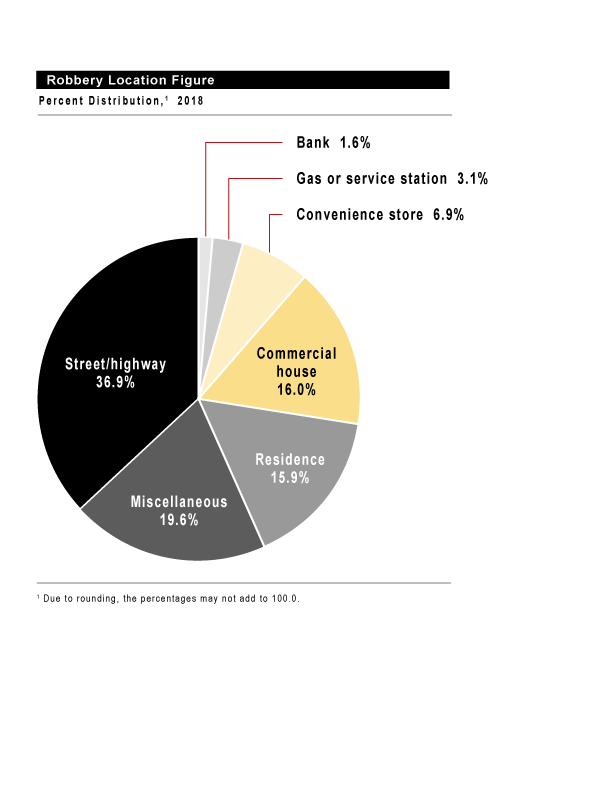Robbery
Definition
The FBI’s Uniform Crime Reporting (UCR) Program defines robbery as the taking or attempting to take anything of value from the care, custody, or control of a person or persons by force or threat of force or violence and/or by putting the victim in fear.
Overview
- There were an estimated 282,061 robberies nationwide in 2018. The estimated number of robberies decreased 12.0 percent from the 2017 estimate and decreased 12.6 percent from the 2014 estimate. The 2018 estimate was down 31.0 percent from the 2009 estimate. (See Tables 1 and 1A.)
- The estimated robbery rate of 86.2 per 100,000 inhabitants in 2018 showed a decrease of 12.6 percent when compared with the 2017 rate. (See Tables 1 and 1A.)
- In 2018, the average dollar value of property stolen per reported robbery was $2,119. Robberies accounted for an estimated $598 million in losses. Residences experienced the highest average dollar loss at $4,600 per offense. (Based on Tables 1 and 23.)
- Among the robberies for which the UCR Program received weapon information in 2018, strong-arm tactics were used in 43.0 percent, firearms in 38.2 percent, and knives or cutting instruments in 8.3 percent. Other dangerous weapons were used in 10.4 percent of robberies in 2018. (Based on Table 19.)
Expanded data
Expanded offense data are the details of the various offenses that the UCR Program collects beyond the count of how many crimes law enforcement agencies report. These details may include the type of weapon used in a crime, type or value of items stolen, and so forth. In addition, expanded data include trends (for example, 2-year comparisons) and rates per 100,000 inhabitants.
Expanded information regarding robbery is available in the following tables:
- Location Type, average value of items stolen by location per robbery: Table 23
- Robbery Table 1, “Robbery, Location, Percent Distribution by Region, 2018”
- Robbery Table 2, “Robbery, Location, Percent Distribution by Population Group, 2018”
- Robbery Table 3, “Robbery, Types of Weapons Used, Percent Distribution by Region, 2018”
Robbery Location Figure


